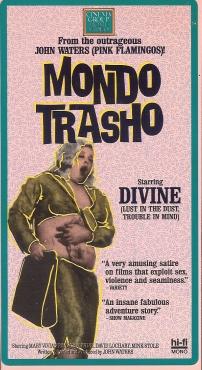Plot
After an introductory sequence during which chickens are beheaded on a chopping block, the main action begins. Platinum blond bombshell Mary Vivian Pearce begins her day by riding the bus and reading Kenneth Anger's Hollywood Babylon .
Bombshell is later seduced by a hippie degenerate "shrimper" (foot fetishist), who starts molesting her feet while she fantasizes about being Cinderella. She is then hit by a car driven by Divine, a portly blonde who was trying to pick up an attractive hitchhiker whom she imagines naked.
Divine places Bombshell in the car and drives to a thrift store where she steals clothes for her and later steals shoes from a dead homeless woman.
The Bombshell is then brought to a coin laundry where Divine cleans her face up with a wipe and changes her into the clothes she stole. Divine is then visited by the Blessed Virgin Mary (Margie Skidmore)—during which Divine exclaims, "Oh Mary ... teach me to be Divine". Divine is then gifted a wheelchair by Mary which she uses to wheel the unconscious Bombshell around.
When Divine returns to her car she is in shock to see that it has been stolen by a man in sunglasses. While trying to take a detour to the doctor's, Divine and the bombshell are then captured in a violent asylum.
At the asylum, Divine is robbed of a cigarette and watches in disgust as topless tap dancer get sexually assaulted before Virgin Mary visits her again, this time giving her a hunting knife. After seeing the miracle, the inmates break out of the asylum and flee happily into Baltimore
Divine finally takes the unconscious Bombshell to Dr. Coathanger and his dangerously ill nurse, who amputates her feet and replace them with bird-like monster feet which she can tap together to transport herself around Baltimore.
Meanwhile Divine is interrogated by a reporter which she shows disdain to until the camera starts taking photos. She is then beaten by a member of the police, which leads to a gunfight between him and many bystanders. Divine throws a lamp at the police officer and wrestles with the officer until she kills him, she accidentally stabs herself in the stomach in the process. After Dr. Coathanger tries to abduct a high school girl, he drops the Bombshell and Divine in the woods but as she is about to succumb to her wounds, she is taken and "granted divinity," by Virgin Mary.
The Bombshell then travels across Baltimore with her bird feet, which leads to her being mooned by greasers in an alley and being repeatedly insulted by two snobs.
Production
Depending on versions of the story; either Waters or the whole crew (except Divine) was either arrested or nearly arrested during production for illegally shooting a scene involving a nude hitchhiker on the campus of Johns Hopkins University. However, according to contemporary newspaper accounts, only one person was immediately arrested, actor Mark P. Isherwood. [2] [3] Charged sometime later were John Waters, Nancy Stoll, David C. Lochary and Mary V. Pearce, all five for indecent exposure, but the charges were eventually dropped. [4] [5]
Title
The film's title refers to a series of semi-related quasi-documentary films that were popular during the 1960s: Mondo Cane , Mondo Freudo, Mondo Bizarro, etc. The title also pays tribute to Mondo Topless , a film by one of Waters' favorite directors, Russ Meyer.
Music
Waters, in a 2008 interview, stated that the songs used in the film were taken right out of his own record collection. Waters says he did not pay the proper licensing fees to use these songs because he could not afford to. It is because of this, Waters says, that Mondo Trasho remains out of distribution, as the still-unsecured music rights would be too prohibitively expensive to clear.
The film was only produced in 1984 on a 95-minute R-rated VHS with hi-fi mono sound in black and white by Cinema Group Home Video.
In an interview with the Harvard Book Store in Cambridge, Massachusetts, on tour for his book release of Mr Know-It-All: The Tarnished Wisdom of a Filth Elder (2019), Waters stated that Mondo Trasho would never get released again due to copyright issues with the music and that it would cost $1 million dollars just to secure rights for the music. [8]
This page is based on this
Wikipedia article Text is available under the
CC BY-SA 4.0 license; additional terms may apply.
Images, videos and audio are available under their respective licenses.
